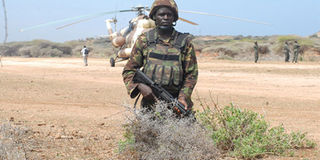Pulling Kenya troops out of Somalia in wake of Westgate attack not an option

PHOTO | SALATON NJAU | FILE A KDF soldier at the Kismayo International Airport on October 2, 2012.
What you need to know:
- Kenya is not in Somalia to have a great adventure. It went into southern Somalia in response to an absolutely burning security imperative
- Few countries have a greater self-interest in stabilising Somalia than Kenya
Kenyans — we are so obsessed with our humdrum domestic politics that we pay almost no attention to important regional issues that affect us.
When a big calamity like the Westgate attack happens, we latch onto the most ridiculous conclusions in the heat of the moment. The suggestion that Kenya should pull its troops out of Somalia in the wake of Al-Shabaab’s killing spree on September 21 can only be taken as a joke.
Kenya is not in Somalia to have a great adventure. It went into southern Somalia in response to an absolutely burning security imperative.
The only mistake in the whole of Operation Linda Nchi came at the beginning: President Kibaki neglected his duties as Commander-in-Chief and failed to address the nation to explain the mission.
If he did not have the guts to do it, he should have given the task to Prime Minister Raila Odinga because, on this matter, there was strong cross-party consensus within the government. The case was a simple one to make. No country pays a bigger price for the problems in Somalia than Kenya.
The reason the Americans, British and Scandinavians are so interested in the Westgate attack is because of reports that dozens of their nationals are fighting alongside the Shabaab and the implication is that they could return with their passports to cause mayhem at home.
Kenyan recruits into the Shabaab run into the hundreds. As far back as 2006, Security Minister John Michuki was a lone voice in government warning that the Shabaab’s recruitment drive in Kenya — abetted by what he called “fiery preaching in the mosques” — would cost Kenya dearly.
We know a lot of this history thanks to the thousands of leaked US embassy cables released by WikiLeaks. In one dispatch dated October 27, 2006, Michuki said there was need to reinforce the border militarily, not necessarily to intervene in Somalia but to “put the fear of God” into Al-Shabaab.
Things changed dramatically two years later. Al-Shabaab captured Kismayu in August 2008. And in mid 2011, the Shabaab were forced out of Mogadishu by Ugandan and Burundian troops and retreated en masse south towards the Kenyan border.
So this was the situation you had. A terrorist group, whose members included Fazul Abdullah Mohamed who plotted the 1998 embassy bombings and the Kikambala attacks, controlled territory up to the border including Dhobley, a town not more than five kilometres from Kenya.
This group was making Sh4 billion a year from taxes at the Kismayu port, which also happened to be a key route of supplies from Yemen. And it was attacking inside Kenya at its leisure. The media focused mainly on the killing of a British tourist and a French tourist and the abduction of Spanish aid workers and a few other tourists.
DECISION WAS UTTERLY SOUND
To my mind, the most significant development was the kidnapping — inside Kenyan borders — of two KDF soldiers, Sergeant Jonathan Kipkosgei Kangogo and Corporal Evans Mutoro on July 24, 2011.
Only a country courting total state failure would accept this situation, sit back and hope for the best. The decision to go into Somalia was utterly sound. The insistence to this day by Kenya that terrorists must not run Kismayu makes sense.
The only failing in this strategy was noted by former Internal Security Minister GG Kariuki in an article in this newspaper in the early days of Operation Linda Nchi. It was that the intervention should have been accompanied by a massive effort to ensure that our internal policing capabilities are equal to the task of dealing with Shabaab’s inevitable activities inside Kenya.
That is the challenge that still remains to be tackled. Few countries have a greater self-interest in stabilising Somalia than Kenya, not least because, despite the insistence of western NGO spokesmen who have been loudest in condemning Kenya’s actions in Somalia, the country can’t host hundreds of thousands of refugees indefinitely. Vision 2030, too, will remain a pipe dream if Somalia’s key export to Kenya remains guns and radicalised youth.
None of these issues will be addressed by turning tail and running away from Somalia at this stage.
Murithi Mutiga is Special Projects Editor, Sunday Nation. [email protected]





